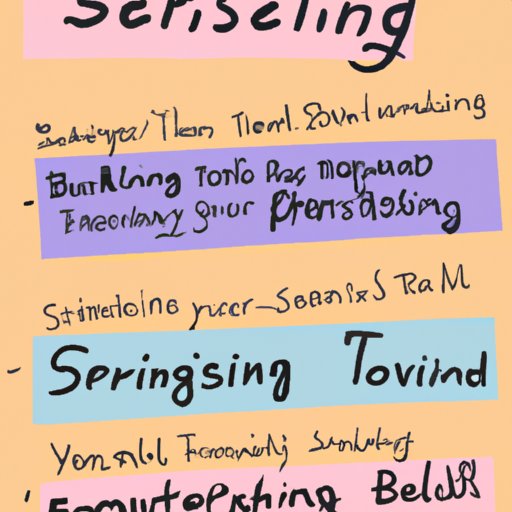Introduction
Selfishness has long been seen as a character trait that is frowned upon. Many view it as a quality of someone who is greedy and unwilling to share with others. But this isn’t necessarily the case. In fact, being selfish can actually be beneficial for both you and those around you. It’s all about finding a balance between taking care of yourself and caring for those around you. To do this, it’s important to understand what it means to be selfish and how to practice it in a healthy way.
At its core, selfishness is simply the act of putting your own needs and wants first. This doesn’t mean disregarding the needs of others completely, but rather making sure that your own needs are met before focusing on the needs of others. According to psychologist Dr. Robert Glover, “Selfishness is an essential part of healthy living. When we take care of ourselves first, we have more energy, resources, and capacity to give to others.”
Prioritize Yourself
The first step in learning how to be selfish is to make your own needs and wants a priority in your life. This doesn’t mean ignoring the needs of others, but rather making sure that your own needs are taken care of first. This can be difficult for some who are used to putting the needs of others before their own, but it is an important step in learning how to be selfish.
One way to do this is to start saying “no” more often when asked to do something. This can be hard at first, but it’s important to remember that you don’t owe anyone anything and it’s okay to decline requests if they don’t fit within your priorities. Another way is to make time for yourself every day. Whether it’s spending time reading, writing, or engaging in a hobby, make sure you’re taking time to do something that you enjoy.
Set Boundaries
Another important part of being selfish is to respect your time, energy, and resources. This means setting boundaries with those around you and not overextending yourself. It can be easy to want to please everyone, but it’s important to recognize when you need to say no and draw the line. Setting boundaries is a form of self-care and will help you to stay grounded and focused on what’s truly important.
Boundaries can come in many forms. It could be setting a limit on how much time you spend with certain people, or how much you’re willing to help out with a project. It could also be setting limits on how much energy you’re willing to expend on certain tasks. Whatever the case may be, it’s important to recognize when you need to take a step back and draw the line.
Invest in Yourself
When it comes to being selfish, it’s also important to invest in yourself. This means spending time and money on activities and experiences that make you happy. This could be anything from taking a yoga class to going on a weekend getaway. Whatever it is, make sure you’re doing things that bring you joy and that you’re investing in yourself in some way.
It can be easy to neglect yourself when you’re busy taking care of other people or obligations. But it’s important to remember that taking care of yourself is just as important. Investing in yourself doesn’t have to be expensive either. It could be as simple as taking a walk outside, going for a bike ride, or cooking yourself a nice meal.
Practice Self-Care
In addition to investing in yourself, it’s important to practice self-care in order to be selfish. Self-care is any activity that helps to boost your well-being. This could be anything from meditating to journaling to getting enough rest. Whatever it is, make sure you’re taking time to engage in activities that make you feel good and that help to keep you grounded.
Self-care doesn’t have to be complicated either. It could be as simple as taking a few minutes each day to sit in silence and reflect, or taking a hot bath after a long day. The key is to find activities that work for you and that make you feel good. And don’t forget to make time for these activities. Just like any other commitment, it’s important to set aside time for yourself in order to make sure you’re taking care of yourself.
Speak Up
Finally, it’s important to speak up and voice your opinions and desires confidently. Don’t be afraid to stand up for yourself or to express your thoughts and feelings. This can be hard to do at first, but it’s a necessary step in learning how to be selfish. Remember, you are the only one who can advocate for yourself and it’s important to make sure your voice is heard.
Conclusion
Being selfish is not a bad thing. In fact, it’s an essential part of healthy living. Taking care of yourself and making sure your needs are met is necessary in order to be able to take care of others. So, start by prioritizing yourself, setting boundaries, investing in yourself, practicing self-care, and speaking up. These are all essential steps in learning how to be selfish in a healthy and beneficial way.
And remember, being selfish doesn’t mean disregarding the needs of others. It’s all about finding a balance between taking care of yourself and caring for those around you. So, go ahead and prioritize yourself, set boundaries, and invest in yourself. You deserve it.
(Note: Is this article not meeting your expectations? Do you have knowledge or insights to share? Unlock new opportunities and expand your reach by joining our authors team. Click Registration to join us and share your expertise with our readers.)
